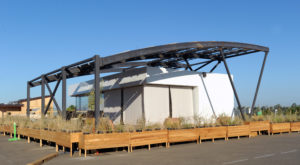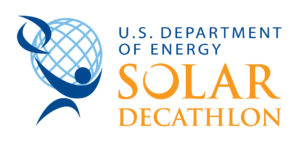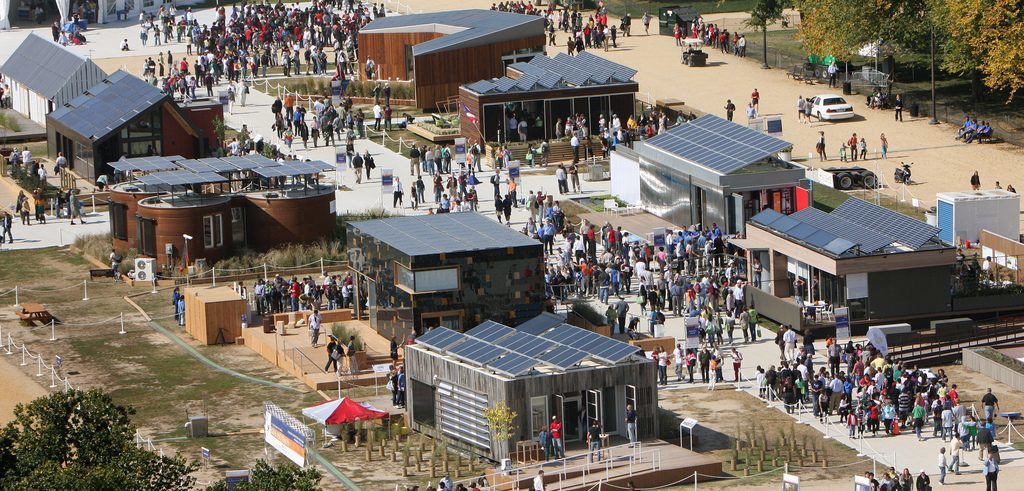For the last two years, fourteen teams of the most advanced college students in the world have dedicated themselves to preparing for the upcoming 2017 Solar Decathlon, a premier global competition. On October 5-15, 2017, the participants unveiled the full-size solar powered homes which they had worked for two years to design and build. They were judged on design excellence, smart energy production, innovation, market potential, and energy and water efficiency.

The ten events of the Decathlon included:
1. Architecture
2. Market potential
3. Engineering
4. Communications
5. Innovation
6. Water
7. Health and comfort
8. Appliances
9. Home life
10. Energy
Throughout the nine-day competition, participants demonstrated their success in all ten events and were awarded up to 100 points in each. All teams that successfully built a fully functioning zero energy house received $100,000. Top finishers were awarded an additional cash prize, with the first place team receiving an additional $200,000. The winning team represented the group which best combined design excellence with technology, market potential, efficiency, and energy production.
The Decathlon is an immersive spectator sport (with free admission!). Visitors undergo an intense learning experience as they are introduced to the latest technologies and materials in energy-efficient design, clean energy technologies, smart home solutions, water conservation measures, electric vehicles, and sustainable buildings. The program includes a sustainability expo, professional development and consumer workshops. Visitors can also tour the fourteen zero energy houses.
For the first time in competition history, the event was held in Denver, CO, the hometown of the first ever Solar Decathlon champions, University of Colorado. Hosted by the U.S. Department of Energy, the zero energy community of houses will be located next to the future site of the Peña Station Next carbon-neutral energy district development near the Denver airport.
Teams must first make it through a preliminary selection process based on their conceptual design proposals to be awarded a spot in the competition. College students and faculty from an institution may form a team, or multiple universities can join to submit a proposal. Teams selected for this year’s competition include: Georgia Tech, Las Vegas, Maryland, Missouri S&T, Netherlands, Northwestern, Swiss Team, Team Alabama, Team Daytona Beach, UC Berkeley, UC Davis, Wash U, Washington State, and West Virginia. To view the teams’ profiles and see their proposed designs, visit http://www.solardecathlon.gov/2017/competition-teams.html.
Both efficiency and solar energy must be strategically applied in the designs to achieve zero energy. Simulating a real-world scenario, teams must design for a target client, build to the Solar Decathlon Building Code, and demonstrate the functionality of their house by performing household chores and hosting neighborhood dinner parties and game nights. The design must also power the team’s electric vehicle for the week.
Since the first Solar Decathlon in 2002 and the second in 2005, the event has been held biennially. It has spread globally, w ith competitions in Europe, China, Latin America, the Middle East, and Africa. More than 35,000 students have formed more than 200 teams of participants. The event provides hands-on experience which prepares competitors for jobs in clean energy. It also raises awareness of the clean energy industry and demonstrates to the public the comfort and savings of energy-efficient design and construction, and renewable energy systems. Many innovative technologies and solutions introduced by teams in the Solar Decathlon have advanced the global residential building industry.
ith competitions in Europe, China, Latin America, the Middle East, and Africa. More than 35,000 students have formed more than 200 teams of participants. The event provides hands-on experience which prepares competitors for jobs in clean energy. It also raises awareness of the clean energy industry and demonstrates to the public the comfort and savings of energy-efficient design and construction, and renewable energy systems. Many innovative technologies and solutions introduced by teams in the Solar Decathlon have advanced the global residential building industry.

